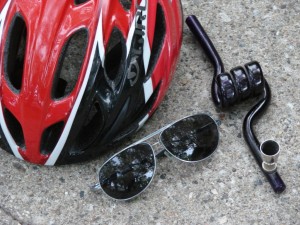BIKE MONTH: Riding high is not a crime
 Each year in June, local cyclists celebrate something called Bike Month and we get to see lots of wholesome news stories that extol the environmental and physical benefits of bicycles.
Each year in June, local cyclists celebrate something called Bike Month and we get to see lots of wholesome news stories that extol the environmental and physical benefits of bicycles.
We’re not doing that here. We’re focusing our Bike Month stories on some of the things cyclists don’t mention when they’re being interviewed by The Edmonton Journal – like riding while high on marijuana.
“How can you go wrong? Smoking up is a great experience and riding is a great experience. Combine them both and it’s awesome,” says Monique (not her real name), a year-round bicycle commuter in Edmonton.
While marijuana itself is still illegal in Alberta, riding a bicycle while impaired by marijuana or alcohol is not.
“You can’t be charged with impaired cycling,” says Clair Seyler, spokesperson for the Edmonton Police Service.
Section 253 of the Criminal Code of Canada – the part that says it’s a crime to drive impaired on drugs or alcohol – states specifically that the law only applies to motor vehicles. Boats, trains, and even airplanes are covered under the section, but bikes aren’t. The best the police can do is charge high riders with public intoxication under the provincial Gaming and Liquor Act. It would also be possible to be charged with careless driving under the Traffic Safety Act, but a cyclist would have to be violating the rules of the road before being pulled over.
Seyler adds that just because it’s not illegal to be a wasted cyclist doesn’t mean it’s safe, “A bicycle requires balance and judgement, and all of those are likely to be impaired by alcohol and drugs.”
Cyclists who ride high don’t see marijuana and alcohol as being the same. Joanna (not her real name), is a mountain biker from B.C. who was riding trails in Edmonton’s river valley this week. She says she has pedalled on everything from alcohol to ecstasy and magic mushrooms. And while crashes are a fact of life for mountain bikers, she says they happen more often when she’s been drunk because she says her reactions are slower with alcohol.
Half the people on the mountain smoke marijuana at the top of a hill, she says.
“If I’m riding downhill I find I’m a little bit faster and more daring and more focused. Usually I enjoy it with music,” Joanna says about her experiences riding on marijuana. “When I’m riding cross-country, I find I’m a bit lazier, especially on the uphill sections.”
Monique, meanwhile, says alcohol affects judgement and balance, which she says pot doesn’t do.
“I’ve noticed among my social group that people who are drunk have more accidents,” she says.
 Scientific evidence on the differences between operating vehicles under the influence of marijuana compared to alcohol focuses exclusively on motorized transport. According to a story in the Hartford Courant in 2010, researchers from Hartford Hospital and the University of Iowa Carver College of Medicine found that marijuana had little effect on people who drove in a simulator. The study found no significant difference between the groups in the collision-avoidance tests. All of the test subjects had smoked before, and some got real joints and others got a placebo in the tests. The only difference between high and sober drivers was when the participants were required to do math calculations while they drove. The ones who were high slowed down.
Scientific evidence on the differences between operating vehicles under the influence of marijuana compared to alcohol focuses exclusively on motorized transport. According to a story in the Hartford Courant in 2010, researchers from Hartford Hospital and the University of Iowa Carver College of Medicine found that marijuana had little effect on people who drove in a simulator. The study found no significant difference between the groups in the collision-avoidance tests. All of the test subjects had smoked before, and some got real joints and others got a placebo in the tests. The only difference between high and sober drivers was when the participants were required to do math calculations while they drove. The ones who were high slowed down.
University of Alberta toxicologist Dr. David Cook, an expert on marijuana, told the Edmonton Journal in January 2003 that he didn’t believe marijuana impaired drivers as much as alcohol.
“There is no question alcohol increases the accident rate. You think you have room to overtake and you don’t. You think you can beat the light and you can’t,” Cook is quoted in the story.
Cook’s quote about high drivers is memorable: “They stop at traffic lights for a couple of cycles (red and green lights) because they’ve noticed a neat billboard across the street,” he said.
The results of the Hartford study, however, appear to conflict with another that was done by Dalhousie University associate professor and published in the British Medical Journal earlier this year. Dr. Mark Asbridge studied accident reports and found that drivers who consumed cannabis were twice as likely to cause a motor vehicle crash.
David Hay, a Vancouver lawyer who writes a legal column in the commuter-oriented cycling magazine, Momentum, points out that cyclists who ride high could still end up in hot water if they end up in an accident. They could face criminal negligence charges and other liability issues.
“Impaired operation of a bike exposes cyclists in civil cases involving personal injuries, and can lay the foundation for a defence of contributory negligence in the event a cyclist is injured and brings an action for damages,” Hay wrote in an email to Gig City. “In short, riding while drunk is not a good move, but unless something happens there won’t likely be any legal repercussions.”
Motorists who drink and drive, and many cyclists who drink and ride, tend to do so because they’ve been drinking and need to go somewhere. Riding while high is different. Many who do it say it enhances the cycling experience.
Joanna, meanwhile, says she hasn’t ridden drunk or stoned for at least a few months. She says she prefers riding sober: “It’s a more realistic experience. It’s more focused on the biking itself.”











